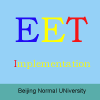-
Mobile technology for education
普通类 -
- 支持
- 批判
- 提问
- 解释
- 补充
- 删除
-
-
Mobile technology for education
MOBILE TECHNOLOGY and the concept of m-learning is an evolving trend in education at all levels. Even classrooms with younger children are benefiting from the use of hand-held and laptop computers.
Research into new mobile technologies that enhance instructional activities will continue to help the educational community as it embraces the idea of anytime, anywhere learning. M-learning is not just about readily accessible information -- it opens up the possibility for the delivery of audio information, interactive learning and assessment, and real-time distance collaboration.-
Overview
As technology rapidly advances, new ideas for mobile learning will also emerge. The technologies discussed here are a few that are currently being researched in education. As costs and availability drop for technology in general, others will likely emerge to take their place. All of these devices can be used as an individual resource, but are best put to use as a collaborative tool, creating new interactions between students and faculty.-
PDAs
Personal Digital Assistants, or PDAs, are probably now the most common type of mobile technology currently being researched and used in education. There are many instructional activities that can be enhanced using these hand-held devices such as note-taking, collaborative simulations, and accessing digital textbooks.
One research project being conducted with PDAs is a project at The University of California, San Diego called ActiveCampus. The ActiveCampus project includes ActiveClass and ActiveCampus Explorer. ActiveClass uses PDAs in the classroom to enable collaboration between students and professors by serving as a moderator for interaction in the classroom. Students can ask questions anonymously and vote on the relative importance of other’s questions using their PDAs. This enables the instructor to focus on the greatest interest and instructional needs of the class as a whole. ActiveCampus Explorer helps students engage in campus life by using their location on campus to provide information to their PDA.-
Tablet PCs
A tablet PC is a compact and portable device typically the size of a spiral bound notebook. They incorporate many of the features of a laptop computer while also giving learners the power to write lecture notes and save them electronically among other features. Tablet PCs can easily be used for students to electronically take tests or fill out surveys and then send that information directly to the instructor over a network. Tablet PCs are the most versatile form of mobile technology at the moment because they combine the functionality of a laptop and a PDA.
There are many research projects using Tablet PCs, such as a project between MIT and Microsoft Corporation called the iCampus research project which used them to encourage student collaboration and creative design efforts. The project is experimenting on how technology can enhance the educational process by innovating technology’s use in instruction.-
Cell phones
With technological advances and steadily decreasing cost, cell phones are emerging as a viable option for mobile education. Although their small screen size can have an effect on the types of activities they will support, their portability and interactivity expand other options and possibilities for research in learning. The idea of cell phones as mobile learning devices is currently more popular abroad than in the United States. In places like Japan, where more people own cell phones than PCs, the potential for m-learning with cell phones is on the rise.
Cell phones are suited particularly well for education in foreign languages and other instructional areas where audio is necessary or preferred. Projects are currently underway that enable students to receive school notes on their mobile phones and to answer exam questions as well as. Sprint has announced the availability of Sprint Campus Connect, a mobile solution that allows a school to make its educational and administrative resources available anytime, anywhere through a single, consistent interface on the enhanced Sprint Nationwide PCS Network.-
Author
Rachel Moss
Moss, R. (2004). Mobile technology in education. In B. Hoffman (Ed.), Encyclopedia of Educational Technology. -
-
- 标签:
- pcs
- tablet
- pdas
- education
- mobile
- students
- phones
- project
- information
- technology
- cell
-
加入的知识群:



学习元评论 (0条)
聪明如你,不妨在这 发表你的看法与心得 ~